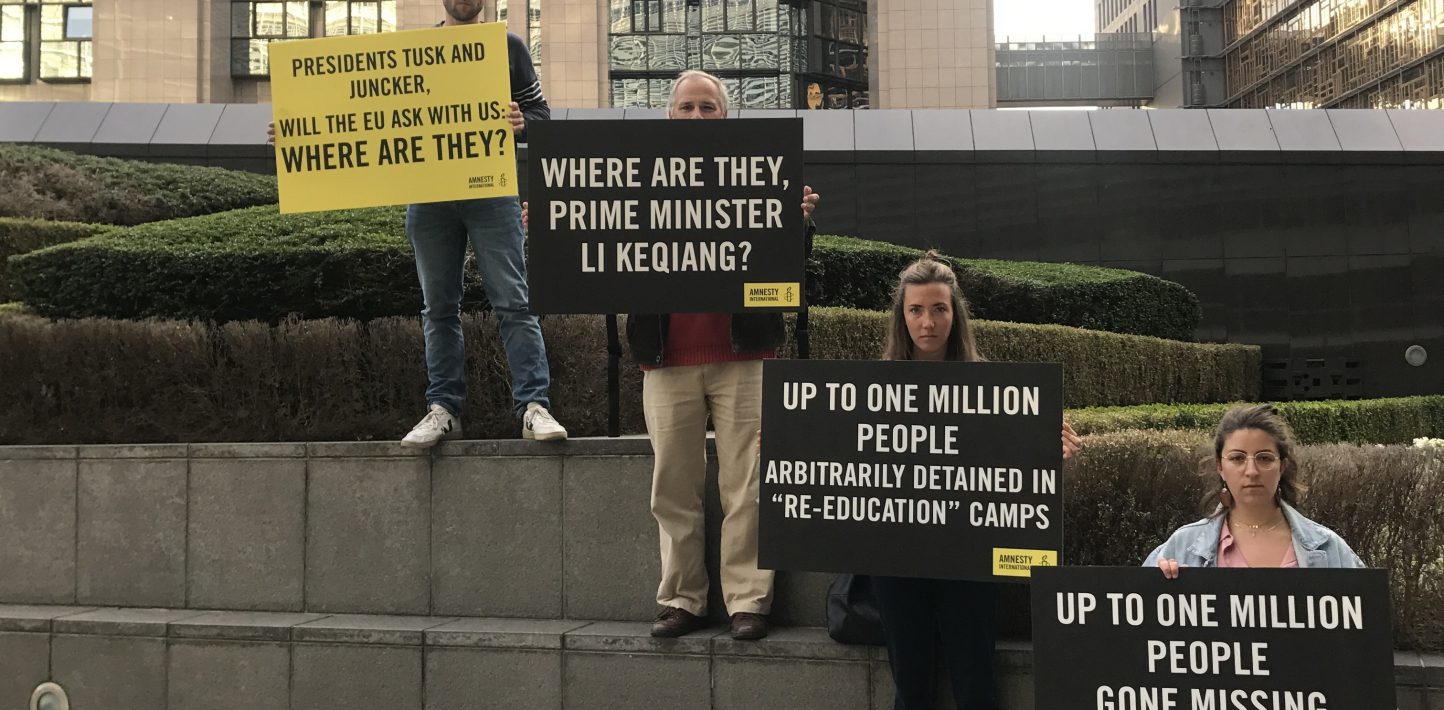Forcefully, Publicly Raise Xinjiang, Imprisoned Activists
Joint Press Release
Brussels, 04 April 2019
European Union leaders should press their Chinese counterparts on the deteriorating human rights situation in the country during the EU-China Summit in Brussels on April 9, 2019, five human rights groups said today. They should amplify concerns raised during the EU-China human rights dialogue on April 1-2 and call on Chinese authorities to close “political education” camps in Xinjiang and free imprisoned dissidents.
In the weeks leading up to the summit, the EU and leaders of member states have had multiple opportunities to raise human rights concerns in meetings with their Chinese counterparts. Yet EU High Representative Federica Mogherini, and later French President Emmanuel Macron, German Chancellor Angela Merkel, and EU Commission President Jean-Claude Juncker, all failed to publicly reference or call for an end to growing human rights violations in China.
“The EU and its member states have publicly pledged to ‘throw their full weight’ behind human rights advocates, and that promise is being tested amid the ruthless crackdown and rapidly deteriorating human rights environment in China,” said Lotte Leicht, EU advocacy director at Human Rights Watch. “The EU-China Summit is an important opportunity for the EU to send strong public messages on rights to the Chinese leadership.”
In a March 13 letter to EU leaders and member states’ foreign ministers, the groups detailed severe erosions of human rights in China, including the mass arbitrary detention and surveillance of Turkic Muslims, the intensified political education in Tibet, and the persecution, enforced disappearance, and jailing of peaceful activists, human rights defenders, and defense lawyers
EU leaders should recognize that their quiet diplomacy has done little to arrest the downward spiral of human rights in China
Roseann Rife East Asia Research Director at Amnesty International
The groups also addressed China’s growing threat to human rights worldwide through efforts to undermine international human rights law and weaken institutions such as the United Nations Human Rights Council. The rapid expansion of China’s Belt and Road Initiative without sufficient rights safeguards, and China’s intense pressure on governments to forcibly return asylum seekers and others who would be at serious risk in China, are also having an impact on human rights worldwide.
On April 1-2, the EU hosted the 37th round of the EU-China human rights dialogue.Despite principled efforts by the EU External Action Service (EEAS), the dialogue remains a weak diplomatic tool. Chinese authorities consistently fail to demonstrate concrete progress on human rights issues raised by the EU. For the second straight year, Chinese officials canceled the session to meet within dependent civil society organizations, including several that signed the letter.
For more than a decade, EU officials have insisted that the human rights dialogue was their only sure chance to debate human rights with Chinese officials, and was “better than nothing.” Instead, the dialogue has become a dumping ground for human rights concerns and criticism, letting EU and Chinese leaders off the hook from confronting these issues directly at a high level.
The EU’s press release following the April 1 human rights dialogue highlighted important efforts by the EEAS to raise individual cases, and noted that China did not participate in the full agenda of the dialogue, having declined to participate in what the EU described as a “meaningful exchange of views” with civil society.
At previous EU-China Summits, the EU’s top leadership has given little more than token lip service to urgent human rights concerns. The civil society organizations urged the EU Council and Commission presidents to finally fulfill EU pledges and use the April 9 summit to publicly amplify human rights concerns raised at the dialogue, and press for concrete action, including the release of activists and lawyers.
The rights groups urged EU leaders to press China to allow an independent, international fact-finding mission on Xinjiang, to release political prisoners, and to ratify the International Covenant on Civil and Political Rights. They also said that the EU and its member states, at the highest levels of government, should mark the 30th anniversary of the 1989 Tiananmen crackdown on pro-democracy protesters in China.
“EU leaders should be inspired by courageous activists like Huang Qi, Wang Quanzhang, Tashi Wangchuk, and Ilham Tohti, and call for their release when meeting with Chinese leaders,” said Phil Lynch, director of the International Service for Human Rights. “Failing to do so would be a betrayal of these brave human rights defenders languishing in prisons.”
The letter was signed by Amnesty International, Human Rights Watch, the International Campaign for Tibet, the International Federation for Human Rights, and the International Service for Human Rights.
For more Amnesty International reporting on China, please visit:
https://www.amnesty.org/en/countries/asia-and-the-pacific/china/
“EU leaders should recognize that their quiet diplomacy has done little to arrest the downward spiral of human rights in China,” said Roseann Rife, East Asia Research Director at Amnesty International. “They need to show a sense of urgency – and concern – in demanding rights improvements.”
Formore information, please contact:
In Washington, DC, for Human Rights Watch, Sophie Richardson (English,Mandarin): +1-202-612-4341; or +1-917-721-7473 (mobile); or [email protected]. Twitter: @SophieHRW
In Brussels, for Human Rights Watch, Lotte Leicht (English, German, French,Danish): +32-475-68-17-08 (mobile); or [email protected].Twitter: @LotteLeicht1
In Hong Kong, for Amnesty International, Roseann Rife (English): +852-9103-7183(mobile); or [email protected]
In Brussels, for the International Federation for Human Rights, GaelleDusepulchre (English): +32-2-609-44-25; or [email protected]
In Brussels, for the International Campaign for Tibet, Mélanie Blondelle(French, English): +32-2-609-4411; or [email protected].Twitter: @SaveTibet_EU
In Geneva, for the International Service for Human Rights, Sarah M. Brooks(English): +41-78-659-73-37; or [email protected].Twitter: @sarahmcneer


